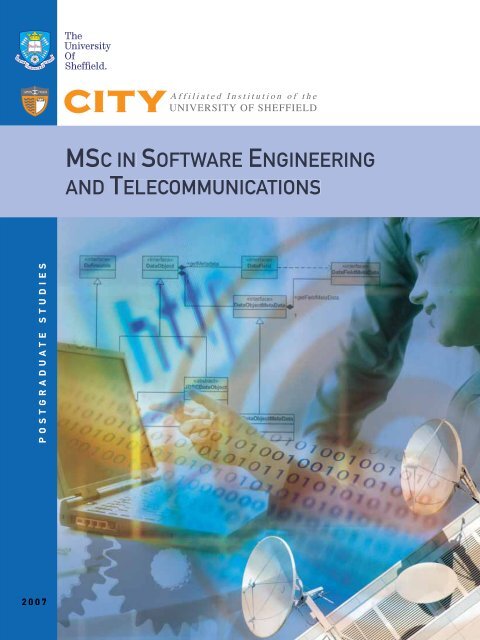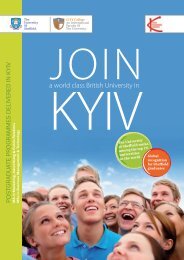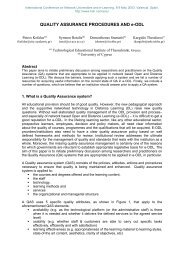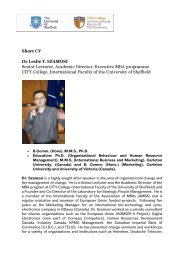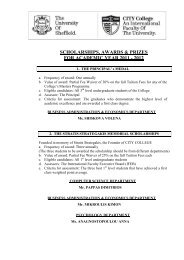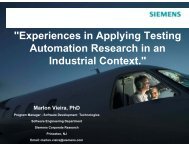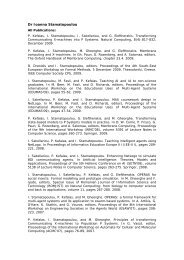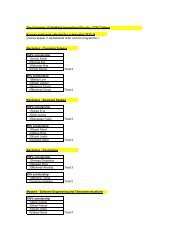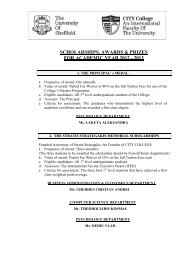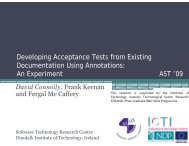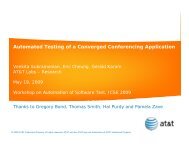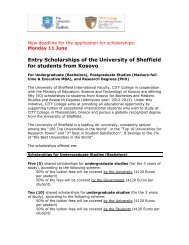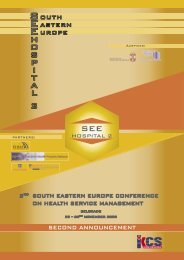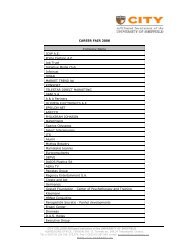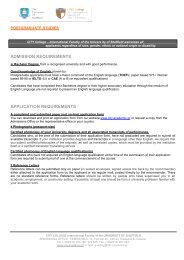msc in software engineering and telecommunications - City College
msc in software engineering and telecommunications - City College
msc in software engineering and telecommunications - City College
Create successful ePaper yourself
Turn your PDF publications into a flip-book with our unique Google optimized e-Paper software.
MSC IN SOFTWARE ENGINEERING<br />
AND TELECOMMUNICATIONS<br />
POSTGRADUATE STUDIES<br />
2007
"The <strong>telecommunications</strong><br />
<strong>in</strong>dustry offers steady,<br />
year-round employment.<br />
Computer <strong>software</strong> eng<strong>in</strong>eers<br />
<strong>and</strong> systems <strong>software</strong><br />
developers receive the highest<br />
average weekly earn<strong>in</strong>gs of<br />
non-supervisory workers <strong>in</strong> the<br />
Telecommunications Industry."<br />
Bureau of Labor Statistics,<br />
U.S. Department of Labor,<br />
Career Guide to Industries,<br />
2006-07 Edition.<br />
"Information <strong>and</strong><br />
communication technologies<br />
(ICT) are a powerful driver for<br />
economy-wide productivity,<br />
growth <strong>and</strong> jobs – <strong>and</strong> are<br />
arguably Europe’s best-bet<br />
<strong>in</strong>vestment for the future.<br />
A quarter of the EU’s GDP<br />
growth <strong>and</strong> 40% of our<br />
productivity growth are due to<br />
ICT. The ICT <strong>in</strong>dustry generates<br />
8% of Europe’s GDP <strong>and</strong><br />
employs 6% of its workforce."<br />
i2010 - A European Information<br />
Society for growth <strong>and</strong> employment<br />
Brussels, 1 June 2005<br />
PROGRAMME RATIONALE >>>>>>>>>>>>>>>>>>>>>>>>><br />
The <strong>software</strong> <strong>and</strong> the <strong>telecommunications</strong> <strong>in</strong>dustries are both at the forefront of<br />
the <strong>in</strong>formation age. The Information <strong>and</strong> Communication Technologies have<br />
become the largest <strong>and</strong> most rapidly develop<strong>in</strong>g sectors of the European Union<br />
<strong>and</strong> world economy. Furthermore, the constant growth of the Internet leads to the<br />
emergence of new technologies, novel services, <strong>and</strong> <strong>in</strong>novative products.<br />
Moreover, the emergence of new markets <strong>in</strong> the <strong>software</strong> <strong>and</strong> <strong>telecommunications</strong><br />
sector <strong>in</strong> Southeastern Europe have given rise to grow<strong>in</strong>g dem<strong>and</strong> for highly<br />
skilled <strong>and</strong> specialised professionals <strong>in</strong> this field. In this rapidly evolv<strong>in</strong>g <strong>in</strong>dustry,<br />
cont<strong>in</strong>uous education is important for telecommunication <strong>and</strong> <strong>software</strong> eng<strong>in</strong>eers.<br />
Professionals must keep their job skills <strong>and</strong> knowledge up to date. Increased<br />
knowledge of the new technologies from the fields of both <strong>software</strong> eng<strong>in</strong>eer<strong>in</strong>g<br />
<strong>and</strong> <strong>telecommunications</strong> is of paramount importance.<br />
PROGRAMME AIM >>>>>>>>>>>>>>>>>>>>>>>>>>>>>><br />
The programme focuses on <strong>in</strong>tegrat<strong>in</strong>g the fields of Software Eng<strong>in</strong>eer<strong>in</strong>g <strong>and</strong><br />
Telecommunications, aim<strong>in</strong>g to enhance students’ knowledge <strong>and</strong> skills of<br />
contemporary <strong>software</strong> eng<strong>in</strong>eer<strong>in</strong>g techniques <strong>and</strong> technologies. Additionally, this<br />
programme provides students with the essential knowledge <strong>in</strong> order to develop<br />
<strong>and</strong> support <strong>in</strong>novative, agile <strong>and</strong> robust <strong>software</strong> solutions for the rapidly evolv<strong>in</strong>g<br />
<strong>and</strong> transform<strong>in</strong>g field of <strong>telecommunications</strong>.<br />
BCS ACCREDITATION >>>>>>>>>>>>>>>>>>>><br />
The MSc <strong>in</strong> Software Eng<strong>in</strong>eer<strong>in</strong>g <strong>and</strong> Telecommunications is accredited by the<br />
British Computer Society. Exemption from the BCS Professional Exam<strong>in</strong>ation<br />
provides the academic base for the BCS professional qualification, lead<strong>in</strong>g towards<br />
Corporate Membership <strong>and</strong> BCS Chartered IT Professional.
MSc IN SOFTWARE ENGINEERING<br />
LEARNING OUTCOMES >>>>>>>>>>>>>>>>>>>>>>>>>>><br />
By the end of the programme graduates will have:<br />
• developed the technical <strong>and</strong> managerial skills needed to be an effective leader<br />
with<strong>in</strong> the <strong>software</strong> <strong>in</strong>dustry.<br />
• acquired knowledge <strong>and</strong> skills <strong>in</strong> the key areas of exist<strong>in</strong>g <strong>and</strong> emerg<strong>in</strong>g <strong>software</strong><br />
techniques (such as Internet Enterprise Applications, Service Oriented Architecture<br />
<strong>and</strong> Web services) aga<strong>in</strong>st competitive <strong>software</strong> market needs.<br />
• a thorough underst<strong>and</strong><strong>in</strong>g of products <strong>and</strong> services offered <strong>in</strong> the Telecommunication<br />
sector.<br />
• acquired advanced knowledge <strong>in</strong> <strong>software</strong> eng<strong>in</strong>eer<strong>in</strong>g theory <strong>and</strong> practices.<br />
• ga<strong>in</strong>ed the ability to apply the knowledge acquired on the programme to design<strong>in</strong>g,<br />
develop<strong>in</strong>g <strong>and</strong> test<strong>in</strong>g <strong>software</strong> used <strong>in</strong> Telecommunication bus<strong>in</strong>ess.<br />
• the ability to study, analyse, <strong>and</strong> critically evaluate research done <strong>in</strong> the area of<br />
<strong>software</strong> eng<strong>in</strong>eer<strong>in</strong>g <strong>and</strong> <strong>telecommunications</strong>.<br />
• the academic <strong>and</strong> professional qualifications to pursue a further academic or<br />
professional career.<br />
EMPLOYMENT OPPORTUNITIES >>>>>>>>>>>>>>>>>>>>><br />
Graduates may pursue a career as a professional <strong>software</strong> eng<strong>in</strong>eer or <strong>software</strong><br />
architect <strong>in</strong> <strong>software</strong> development companies or <strong>in</strong> the IT department of enterprises.<br />
The high-level professional skills allow graduates to quickly become an effective<br />
leader with<strong>in</strong> the <strong>software</strong> <strong>in</strong>dustry. Furthermore, the specialisation <strong>in</strong><br />
<strong>telecommunications</strong> enables graduates to work <strong>in</strong> specialised <strong>software</strong> houses,<br />
work<strong>in</strong>g, for example <strong>in</strong> the rapidly grow<strong>in</strong>g area of mobile or h<strong>and</strong>-held devices<br />
or <strong>in</strong> the IT departments of telecommunication companies.<br />
PROGRAMME UNITS<br />
Core Units<br />
Advanced Software Development Techniques<br />
Computer Network<strong>in</strong>g <strong>and</strong><br />
Internet Technologies<br />
Distributed Data Management<br />
Eng<strong>in</strong>eer<strong>in</strong>g Internet Applications<br />
Advanced Software Eng<strong>in</strong>eer<strong>in</strong>g<br />
Wireless <strong>and</strong> Mobile Telecommunications<br />
Contemporary Issues <strong>in</strong> ICT<br />
Industrial Group Project<br />
Dissertation Units<br />
Research Skills <strong>and</strong><br />
Dissertation Preparation<br />
Dissertation<br />
Alternatively, graduates may undertake further research <strong>in</strong> the field. A number of<br />
our graduates have followed a research career by cont<strong>in</strong>u<strong>in</strong>g with PhD studies <strong>in</strong><br />
South-East European Research Centre (SEERC) or other academic <strong>in</strong>stitutions.
AND TELECOMMUNICATIONS<br />
MODES OF STUDY >>>>>>>>>>>>>>>>>>>>>>>>>>>>><br />
The programme is flexible <strong>and</strong> is offered <strong>in</strong> two modes:<br />
The full time programme runs from October to October (1 year), <strong>and</strong> consists of a<br />
taught programme of two semesters from October to June. The project component<br />
of the programme is undertaken <strong>in</strong> the summer period from June to October.<br />
Lectures are held three times a week <strong>in</strong> the even<strong>in</strong>gs.<br />
The part time taught programme runs over two years. The project component is<br />
undertaken <strong>in</strong> the summer period from June to October of the second year.<br />
Lectures are held twice a week <strong>in</strong> the even<strong>in</strong>gs.<br />
ADMISSION CRITERIA >>>>>>>>>>>>>>>>>>>>>>>>>><br />
Admissions are based on the c<strong>and</strong>idate’s academic record, experience,<br />
motivation <strong>and</strong> potential. Applicants are normally expected to hold, or to be<br />
about to achieve, a good Second Class Honours Degree from a University or<br />
similar <strong>in</strong>stitution. The programme is aimed at students who have a Bachelor’s<br />
degree <strong>in</strong> Computer Science or <strong>in</strong> any other numerate or logical discipl<strong>in</strong>e. All<br />
applicants must have a fluent comm<strong>and</strong> of the English language (TOEFL: 575 or<br />
IELTS: 6,5 or equivalent qualifications).<br />
“It might be considered as<br />
exaggeration but my life,<br />
concern<strong>in</strong>g <strong>software</strong> development,<br />
is dist<strong>in</strong>guished <strong>in</strong> a time before<br />
<strong>City</strong> <strong>College</strong> <strong>and</strong> time after. The<br />
MSc <strong>in</strong> Software Eng<strong>in</strong>eer<strong>in</strong>g <strong>and</strong><br />
Telecommunications did not just<br />
provide me with a competitive title<br />
but more importantly with valuable<br />
knowledge <strong>and</strong> skills that were<br />
ga<strong>in</strong>ed through hard work <strong>and</strong><br />
a lot of effort. Through this course,<br />
I have learned not only try<strong>in</strong>g to<br />
do the right th<strong>in</strong>gs but also do the<br />
th<strong>in</strong>gs right. Generally, the MSc<br />
course was an <strong>in</strong>vestment that<br />
deserved the effort <strong>and</strong> the time.<br />
Panagiotis Marantelos<br />
MSc graduate<br />
NEW REVISED PROGRAMME >>>>>>>>>>>>>>>>>>>>>><br />
In June 2007, after five successful years of runn<strong>in</strong>g, the programme went<br />
through a major revision <strong>in</strong> order to reflect current technological trends such as<br />
Enterprise Internet Applications <strong>and</strong> Web Services.<br />
DEGREE TITLE >>>>>>>><br />
MSc <strong>in</strong> Software Eng<strong>in</strong>eer<strong>in</strong>g<br />
<strong>and</strong> Telecommunications<br />
The title is awarded directly<br />
by the University of Sheffield.
UNIT DESCRIPTIONS >>>>>>>>>>>>>>>>>>>>>>>>> >>>>>>>>>>>>>>>>>>>>>>>><br />
ENGINEERING INTERNET APPLICATIONS<br />
This unit covers <strong>in</strong> depth, important aspects specific to Web application<br />
development <strong>and</strong> describes the contemporary core technologies used <strong>in</strong><br />
web applications, such as XML, J2EE, Ajax, <strong>and</strong> Web Services. The unit<br />
prepares students for the development of Enterprise Internet Applications.<br />
Students develop a real-world project us<strong>in</strong>g the acquired knowledge <strong>and</strong><br />
skills <strong>and</strong> work as a team follow<strong>in</strong>g web <strong>software</strong> development process<br />
guidel<strong>in</strong>es.<br />
ADVANCED SOFTWARE DEVELOPMENT TECHNIQUES<br />
This unit presents the task of <strong>software</strong> development with<strong>in</strong> the context of a<br />
real world bus<strong>in</strong>ess environment. It focuses on: <strong>software</strong> eng<strong>in</strong>eer<strong>in</strong>g<br />
pr<strong>in</strong>ciples; object oriented analysis <strong>and</strong> design techniques (us<strong>in</strong>g the UML<br />
notation); well known design practices as design patterns; <strong>and</strong> the<br />
systematic test<strong>in</strong>g of <strong>software</strong>. Students learn about <strong>software</strong> development<br />
activities by participat<strong>in</strong>g <strong>in</strong> a <strong>software</strong> project group, which develops a<br />
work<strong>in</strong>g <strong>software</strong> system <strong>and</strong> all the necessary accompany<strong>in</strong>g<br />
documentation. Furthermore, students actively contribute to the lectures by<br />
review<strong>in</strong>g <strong>and</strong> present<strong>in</strong>g material on <strong>software</strong> development topics.<br />
COMPUTER NETWORKING AND INTERNET TECHNOLOGIES<br />
This unit provides the student with a deep <strong>and</strong> thorough underst<strong>and</strong><strong>in</strong>g of<br />
advanced concepts <strong>in</strong> selected areas of digital communications <strong>and</strong><br />
computer networks <strong>and</strong> Internet Technologies, <strong>in</strong>clud<strong>in</strong>g data cod<strong>in</strong>g <strong>and</strong><br />
error control, Local Area Networks, Data-L<strong>in</strong>k layer protocols,<br />
Internetwork<strong>in</strong>g protocols <strong>and</strong> architectures, Transport layer protocols,<br />
circuit/packet switch<strong>in</strong>g, optical networks, network security <strong>and</strong><br />
cryptography, etc. Emphasis is given to protocols, algorithms, architectures<br />
<strong>and</strong> performance analysis. The unit further aims to: a) enhance the<br />
graduate students’ comprehensive, analytical <strong>and</strong> critical th<strong>in</strong>k<strong>in</strong>g, by<br />
expos<strong>in</strong>g them to advanced research paper work <strong>and</strong> b) provide the<br />
students with practical experience on <strong>in</strong>ter-related network<strong>in</strong>g issues <strong>and</strong><br />
improve their synthetic <strong>and</strong> analytic capabilities, by means of network<br />
simulation projects.<br />
CONTEMPORARY ISSUES IN ICT<br />
This unit aims to present the latest developments <strong>and</strong> various<br />
contemporary topics <strong>in</strong> the field of <strong>in</strong>formation <strong>and</strong> <strong>telecommunications</strong><br />
technology (ICT). Through a series of sem<strong>in</strong>ars <strong>and</strong> lectures presented by<br />
<strong>in</strong>dustrial <strong>and</strong> academic experts <strong>in</strong> the field, students will become aware of<br />
the contemporary issues, problems, solutions <strong>and</strong> consequences <strong>in</strong> the<br />
rapidly develop<strong>in</strong>g area of ICT.<br />
ADVANCED SOFTWARE ENGINEERING<br />
The aim of this unit is to present contemporary topics <strong>in</strong> Software<br />
Eng<strong>in</strong>eer<strong>in</strong>g. It starts with a brief overview of <strong>software</strong> eng<strong>in</strong>eer<strong>in</strong>g<br />
pr<strong>in</strong>ciples <strong>and</strong> then focuses on modern approaches to <strong>software</strong><br />
development such as Agile Methods (eXtreme Programm<strong>in</strong>g a.o.), <strong>software</strong><br />
architecture, <strong>and</strong> advanced techniques <strong>and</strong> technologies such as Service<br />
Oriented Architecture, <strong>and</strong> formal methods. Students will actively contribute<br />
to the lectures, by review<strong>in</strong>g <strong>and</strong> present<strong>in</strong>g material on contemporary<br />
<strong>software</strong> eng<strong>in</strong>eer<strong>in</strong>g topics.<br />
DISTRIBUTED DATA MANAGEMENT<br />
This unit covers topics <strong>in</strong>volv<strong>in</strong>g advanced implementation techniques <strong>and</strong><br />
specific applications of Advanced Database Systems, <strong>in</strong> particular, those<br />
relat<strong>in</strong>g to <strong>telecommunications</strong> applications. Topics such as transaction<br />
management, concurrency control, distributed database architectures <strong>and</strong><br />
applications, data warehous<strong>in</strong>g <strong>and</strong> data m<strong>in</strong><strong>in</strong>g are the backbone of the<br />
module. Major emphasis is placed on contemporary issues <strong>in</strong> database<br />
technology as well as trends <strong>in</strong> commercial applications.<br />
WIRELESS AND MOBILE TELECOMMUNICATIONS<br />
This unit focuses on provid<strong>in</strong>g students with a deep underst<strong>and</strong><strong>in</strong>g of the<br />
concepts of Wireless <strong>and</strong> Mobile Telecommunications as applied <strong>in</strong> today’s<br />
Transmission Systems <strong>and</strong> Cellular Networks. Emphasis is given <strong>in</strong>to<br />
describ<strong>in</strong>g the real life applications of Wireless Systems. Students will<br />
learn about the most current applications of wireless networks <strong>in</strong> voice <strong>and</strong><br />
data communications <strong>and</strong> will be encouraged to actively contribute to the<br />
lectures by present<strong>in</strong>g <strong>and</strong> discuss<strong>in</strong>g their work on the course’s practical<br />
exercises.<br />
INDUSTRIAL GROUP PROJECT<br />
The aim of this unit is to <strong>in</strong>troduce the student to ‘real life’ project<br />
environments. From with<strong>in</strong> the structure of a group, <strong>and</strong> with the help of<br />
local companies, the students are presented with a certa<strong>in</strong> problem<br />
def<strong>in</strong>ition, which needs to be ‘solved’. Students work <strong>in</strong> close cooperation<br />
with experts from the client company <strong>and</strong> college lecturers, <strong>and</strong> are<br />
required to present their f<strong>in</strong>al implementation as well as all relevant<br />
documentation to the client company.<br />
RESEARCH SKILLS & DISSERTATION PREPARATION<br />
This unit <strong>in</strong>tends to <strong>in</strong>troduce students to the research topics <strong>and</strong><br />
techniques that are commonly employed <strong>in</strong> <strong>software</strong> eng<strong>in</strong>eer<strong>in</strong>g <strong>and</strong><br />
telecommunication science. Students will be exposed to the pr<strong>in</strong>ciples of<br />
report writ<strong>in</strong>g, literature review<strong>in</strong>g, <strong>and</strong> research designs <strong>and</strong> approaches.<br />
These research approaches will <strong>in</strong>clude the design of data collection <strong>and</strong><br />
analysis methods, as well as representation <strong>and</strong> <strong>in</strong>terpretation of the<br />
results. An <strong>in</strong>troduction to tools facilitat<strong>in</strong>g quantitative <strong>and</strong> qualitative<br />
analysis will also be provided. The unit is enriched with a number of<br />
exercises, case studies <strong>and</strong> discussions <strong>and</strong> concludes with practical<br />
guidel<strong>in</strong>es of how to write a successful dissertation.
WHY CHOOSE CITY ? >>>>>>>>>>>>>>>>>>>>>>>>>>>>><br />
A SHEFFIELD UNIVERSITY DEGREE<br />
CITY is an affiliated <strong>in</strong>stitution of the University of Sheffield, one of the lead<strong>in</strong>g<br />
universities <strong>in</strong> Brita<strong>in</strong>. All degrees are awarded directly from the University of<br />
Sheffield. It is a unique opportunity allow<strong>in</strong>g you to undertake a University of<br />
Sheffield Master’s or Bachelor’s degree programme whilst study<strong>in</strong>g <strong>in</strong><br />
Thessaloniki, Greece.<br />
EXCELLENT ACADEMIC STAFF AND RESEARCH ENVIRONMENT<br />
CITY is proud of its full time academic staff. 70% hold a PhD degree, all the<br />
professors are experienced teachers with a professional background <strong>and</strong> have<br />
carried out substantial research work. CITY is strongly committed to research <strong>and</strong><br />
heartily encourages <strong>and</strong> supports its staff <strong>in</strong> promot<strong>in</strong>g their research <strong>and</strong><br />
publications.<br />
www.city.academic.gr<br />
EXCELLENT PROVISION FOR STUDENTS<br />
CITY offers a number of different support student services, aim<strong>in</strong>g to help students<br />
to <strong>in</strong>tegrate to their academic <strong>and</strong> social life. The International Affairs Office, the<br />
Accommodation Office, the Career Office, the Student Affairs Office <strong>and</strong> the English<br />
Language Support Unit are some of the services provided.<br />
EXCELLENT JOB AND CAREER OPPORTUNITIES: STRONG LINKS WITH<br />
THE INDUSTRY<br />
The unemployment rate of CITY’s graduates is very low! All graduates are<br />
employed with<strong>in</strong> a short period after their graduation, <strong>in</strong> a wide variety of<br />
companies, services <strong>and</strong> banks. CITY ma<strong>in</strong>ta<strong>in</strong>s strong l<strong>in</strong>ks with the <strong>in</strong>dustry <strong>and</strong><br />
the professions through its Industrial Liaison Board, keep<strong>in</strong>g thus its courses, its<br />
academic staff <strong>and</strong> its students updated <strong>and</strong> the courses relevant, evolv<strong>in</strong>g with<br />
professional developments.<br />
A LIVELY INTERNATIONAL STUDENTS’ COMMUNITY<br />
CITY offers a very lively environment that has a truly multicultural feel with<br />
students from more than 15 countries. It has an open <strong>and</strong> <strong>in</strong>tegrated <strong>in</strong>ternational<br />
student community.<br />
A CITY CENTRE CAMPUS<br />
CITY is situated <strong>in</strong> 4 impressive build<strong>in</strong>gs <strong>in</strong> the centre of the city <strong>and</strong> offers the<br />
students access to numerous facilities.<br />
LIVE AND STUDY IN A BEAUTIFUL, SAFE AND INEXPENSIVE CITY<br />
The city of Thessaloniki is considered the best city to study <strong>in</strong>! It is a very beautiful<br />
city, situated on the sea front. It offers everyth<strong>in</strong>g a big city is supposed to offer,<br />
without loos<strong>in</strong>g the benefits of a city its size, therefore be<strong>in</strong>g a great <strong>and</strong> safe place<br />
to live <strong>and</strong> study! In comparison to other European Countries <strong>and</strong> USA, Greece has<br />
a relatively much lower cost of everyday liv<strong>in</strong>g.<br />
HEAD OFFICES, ADMISSIONS' OFFICE<br />
TSIMISKI BUILDING<br />
13, TSIMISKI STR. 546 24<br />
THESSALONIKI GREECE<br />
TEL.:(+30) 2310 224 186, 2310 275 575<br />
FAX: (+30) 2310 287 564<br />
STEIN BUILDING<br />
2, KALAPOTHAKI STR. 546 24<br />
THESSALONIKI GREECE<br />
TEL.: (+30) 2310 224 026, 2310 224 080<br />
FAX: (+30) 2310 224 061<br />
KOROMILA BUILDING<br />
24, PROXENOU KOROMILA STR, 546 22<br />
THESSALONIKI GREECE<br />
TEL.: (+30) 2310 224 421<br />
FAX: (+30) 2310 269 095<br />
SEERC BUILDING<br />
17, MITROPOLEOS STR. 546 24<br />
THESSALONIKI GREECE<br />
TEL.: (+30) 2310 253 477, 2310 253 478<br />
acadreg@city.academic.gr<br />
CITY OPERATES AS A LABORATORY OF LIBERAL STUDIES UNDER THE LIBERAL STUDIES BILL (ACT No 9, 1935).<br />
IT AWARDS ONLY CERTIFICATES OF STUDIES. THE DEGREES ARE AWARDED DIRECTLY BY THE UNIVERSITY OF SHEFFIELD.


